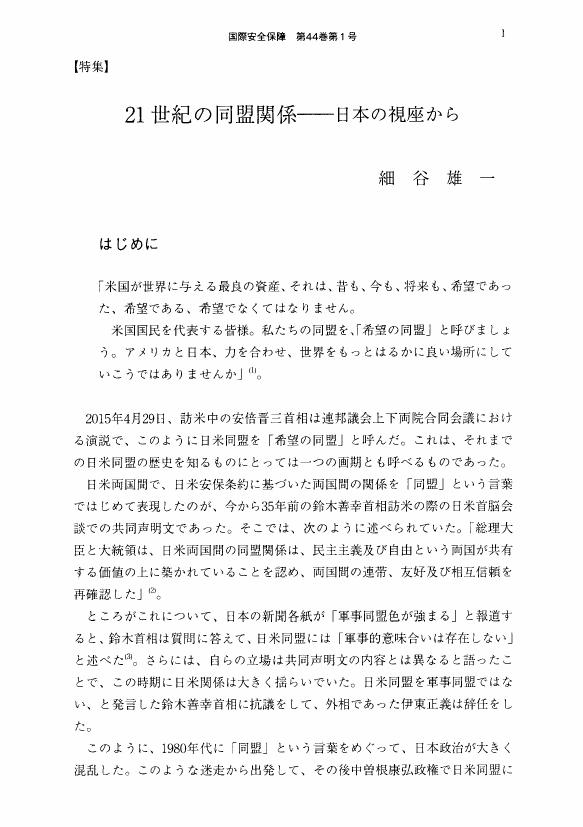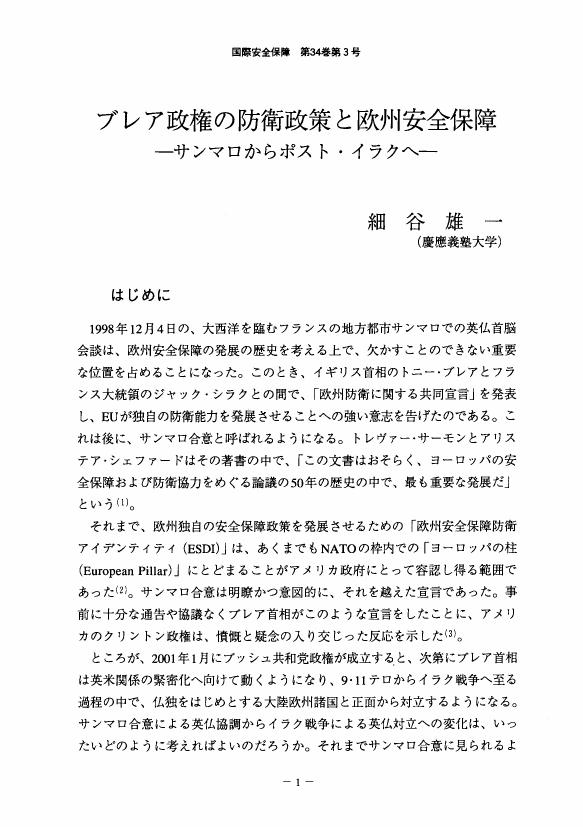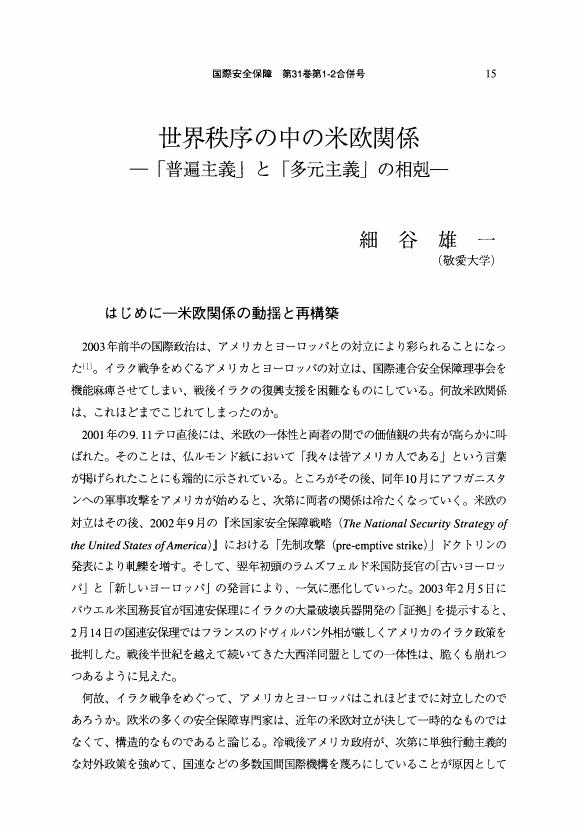57 0 0 0 IR 国連創設とイギリス外交 : 「国際連合」と「西欧連合」の狭間で (赤木完爾教授退職記念号)
- 著者
- 細谷 雄一
- 出版者
- 慶應義塾大学法学研究会
- 雑誌
- 法学研究 = Journal of law, politics and sociology (ISSN:03890538)
- 巻号頁・発行日
- vol.92, no.1, pp.47-71, 2019-01
はじめに一 「ユナイテッド・ネーションズ」の起源、一九四一年-四三年 (1) 「大西洋憲章」から「ユナイテッド・ネーションズ」へ (2) イギリス外務省の「四大国構想」 (3) イギリスの「地域評議会」構想 (4) チャーチルの「地域評議会」構想 (5) モスクワ四国宣言二 ダンバートン・オークス会議へ向けて (1) イギリス政府の構想 (2) 自治領首脳会議おわりに赤木完爾教授退職記念号
- 著者
- 細谷 雄一
- 出版者
- 慶應義塾大学法学研究会
- 雑誌
- 法学研究 (ISSN:03890538)
- 巻号頁・発行日
- vol.87, no.6, pp.138-155, 2014-06
特別記事 : 平成二十五年度慶應法学会シンポジウム EUの政治・経済秩序はじめに一 イギリス政治における反欧州的イデオロギー(一) 欧州懐疑主義の起源 : 一九七五年国民投票(二) サッチャー首相のブルージュ演説(三) イギリス独立党(UKIP)の台頭(四) 欧州人民党からのイギリス保守党の離脱二 キャメロン政権のヨーロッパ政策(一) 保守党の二〇一〇年総選挙マニフェスト(二) 保守=自由の連立交渉(三) 二〇一一年EU法令三 EU加盟を問う国民投票(一) キャメロン首相の国民投票演説(二) キャメロン演説の反響おわりに : イギリス政治の漂流
- 著者
- 細谷 雄一
- 出版者
- 北海道大学大学院法学研究科
- 雑誌
- 北大法学論集 (ISSN:03855953)
- 巻号頁・発行日
- vol.51, no.5, pp.77-120, 2001-01-17
5 0 0 0 OA ウィンストン・チャーチルにおける欧州統合の理念
- 著者
- 細谷 雄一
- 出版者
- 北海道大学大学院法学研究科
- 雑誌
- 北大法学論集 (ISSN:03855953)
- 巻号頁・発行日
- vol.52, no.1, pp.71-117, 2001-05-31
3 0 0 0 イギリスとヨーロッパ : 孤立と統合の二百年
- 著者
- 細谷 雄一
- 出版者
- 北海道大学大学院法学研究科
- 雑誌
- 北大法学論集 (ISSN:03855953)
- 巻号頁・発行日
- vol.52, no.2, pp.1-72, 2001-07-31
2 0 0 0 平和のための軍事力を考える (特集 積極的平和主義と安全保障)
- 著者
- 細谷 雄一
- 出版者
- 外務省 ; 2010-
- 雑誌
- 外交 = Diplomacy
- 巻号頁・発行日
- vol.33, pp.13-21, 2015-09
- 著者
- 細谷 雄一
- 出版者
- 東洋経済新報社
- 雑誌
- 週刊東洋経済 = Weekly toyo keizai (ISSN:09185755)
- 巻号頁・発行日
- no.6437, pp.96-97, 2013-12-29
1 0 0 0 OA 21世紀の同盟関係――日本の視座から
- 著者
- 細谷 雄一
- 出版者
- 国際安全保障学会
- 雑誌
- 国際安全保障 (ISSN:13467573)
- 巻号頁・発行日
- vol.44, no.1, pp.1-9, 2016-06-30 (Released:2022-04-01)
1 0 0 0 OA ブレア政権の防衛政策と欧州安全保障 ―サンマロからポスト・イラクへ―
- 著者
- 細谷 雄一
- 出版者
- 国際安全保障学会
- 雑誌
- 国際安全保障 (ISSN:13467573)
- 巻号頁・発行日
- vol.34, no.3, pp.1-24, 2006-12-31 (Released:2022-04-20)
1 0 0 0 OA 世界秩序の中の米欧関係 ―「普遍主義」と「多元主義」の相剋―
- 著者
- 細谷 雄一
- 出版者
- 国際安全保障学会
- 雑誌
- 国際安全保障 (ISSN:13467573)
- 巻号頁・発行日
- vol.31, no.1-2, pp.15-28, 2003-09-30 (Released:2022-04-24)
1 0 0 0 OA アメリカ・同盟・世界秩序 ――冷戦後アメリカにおける同盟政策の変遷――
- 著者
- 細谷 雄一
- 出版者
- 国際安全保障学会
- 雑誌
- 国際安全保障 (ISSN:13467573)
- 巻号頁・発行日
- vol.29, no.2, pp.5-26, 2001-09-30 (Released:2022-04-28)
1 0 0 0 OA リスボン条約とイギリス ―「やっかいなパートナー」の再来?―
- 著者
- 細谷 雄一
- 出版者
- 日本EU学会
- 雑誌
- 日本EU学会年報 (ISSN:18843123)
- 巻号頁・発行日
- vol.2011, no.31, pp.148-167, 2011-07-20 (Released:2013-07-20)
What was British role in the making of the Lisbon Treaty? Is Britain still “an awkward partner” in the European Union? This article aims to examine British policy towards the European Union from the failure of the ratification of European Constitutional Treaty in 2005 to the signing of the Lisbon Treaty in December 2007. Soon after the failures of the Treaty ratification both in France and in the Netherlands in June 2005, British Prime Minister Tony Blair declared to introduce “a period of reflection” to freeze the process of ratification. From the next month, Britain had hold the presidency of the European Council. Due partly to his domestic stalemate on the ratification, Blair exploited this opportunity to postpone difficult ratification of European Constitutional Treaty. This difficulty originated in Blair’s decision for a referendum on the ratification of the Constitutional Treaty in April 2004. European Constitutional Treaty which was signed on 29 October 2004 caused a big political debate in Britain. Both the Conservative Party and Eurosceptic medias represented by Rupert Murdoch criticized the government for its intention to further transfer political power to Brussels. Having faced with this serious political difficulty, Blair naturally was “off the hook”. He simply felt “the waves of relief”. Blair’s task was two-fold. First, he had to find a solution to this political stalemate as he would soon preside the European Council. Second, he was necessary to sell a new treaty to British people. To avoid a referendum, the British government needed to find a device which indicated that a new treaty was not “constitutional” one. In other words, a new treaty had to be a “reform treaty” without any new transfer of sovereignty. A new French president, Nicolas Sarkozy, supported Britain to advance towards a “reform treaty”. Both French and British governments were contended with omitting any symbol of “federalism” or “constitution”. Within British government, it was generally agreed that Britain needed to defend the “red line” which prevented further transfer of power to the European Union. After having persuaded Angela Merkel, German Chancellor, Britain successfully secured the “red line”, and this meant that British government did not have to go into a national referendum. With this “success”, the EU could reach an agreement on the drafting of the Lisbon Treaty which would become signed in December 2007. After the referendum crises of 2005, British government led the argument on the future of failed Constitutional Treaty. The answer was to save the essence of it by abandoning “federal” and “constitutional” features of the Treaty. This British policy was basically motivated by its own domestic rivalry on the future of Europe. Although Britain might be “an awkward partner” within the EU, the Labour governments tried to find out a way to go out of the crises of 2005 by abandoning some of hopes and wishes that people dreamed.
- 著者
- 細谷 雄一
- 出版者
- 北海道大学大学院法学研究科
- 雑誌
- 北大法学論集 (ISSN:03855953)
- 巻号頁・発行日
- vol.52, no.2, pp.431-502, 2001
- 著者
- 細谷 雄一
- 出版者
- 外務省 ; 2010-
- 雑誌
- 外交 = Diplomacy
- 巻号頁・発行日
- vol.38, pp.78-82, 2016-07
1 0 0 0 IR 戦略家ジョージ・ケナンの誕生--戦略思想研究から冷戦戦略へ、一九四六〜四七年
- 著者
- 細谷 雄一
- 出版者
- 慶應義塾大学法学研究会
- 雑誌
- 法学研究 (ISSN:03890538)
- 巻号頁・発行日
- vol.83, no.3, pp.167-193, 2010-03
はじめに一 ケナンの戦略思想の形成(一) モスクワからワシントンへ(二) 「最終兵器 (The Absolute Weapon)」二 「現代戦略の形成者(Makers of Modern Strategy)」(一) マキアヴェッリ(二) ジョミニ(三) クラウゼヴィッツ(四) スミス、ハミルトン、リスト(五) エンゲルスとマルクスおわりに
- 著者
- 細谷 雄一
- 出版者
- 日本EU学会
- 雑誌
- 日本EU学会年報 (ISSN:18843123)
- 巻号頁・発行日
- vol.2001, no.21, pp.34-63,249, 2001-09-30 (Released:2010-05-21)
Since 1980s, “European integration history”, which has been developed mainly by the European Community Liason Committee of Historians with using newly opend archives, has revealed many new historical evidences. Research on the relations between the Schuman Plan and Britain is one of the biggest issues of that development. However, the study on the “Eden Plan” has been rarely mentioned in the hitherto studies. The study on the Schuman Plan has been usually explained with the development of the Franco-German reconciliation. In this article, it was argued that the relationship between Britain and France was the most important aspect of the beginning of the European integration between 1948 and 1950. The Schuman Plan can be best understood by seeing the Anglo-Franco cooperation and conflict in the period. The year 1948 was marked by several important events such as the establishment of the Brussels Treaty, the Congress of Europe at The Hague, and Georges Bidault's plan on the “European Assembly”. Then in this avricle, the “Eden Plan” was discussed.The “Eden Plan” tells us many important aspects of the relations between the Schuman Plan and Britain in the early 1950s. First, it can be said that Anthony Eden was much more constructive and supportive towards the Schuman Plan than Winston S. Churchill or Harold Macmillan, who were usually regarded as the eminent “Pro-European” Conservatives. Anthony Eden tried to save the Schuman Plan, while finding the best answer to link the British Commonwealth to the Schuman Plan. Eden's approach could be the best possible British plan to join the European integration movement planned by Monnet. However, because of the suspicion of Jean Monnet towards British Government's intention, Monnet refused this possible important contribution by British Foreign Secretary. With the failure of the two Monnet's plans of political integration, the European Defence Community and European Political Community, in 1954, Monnet faced the stalemate of his own approach without having Britain inside.Thus, it is important to see the history of the relations between Britain and France from 1948 to 1954 to understand the beginning of European integration. Too narrow approach to study the Schuman Plan often ignores the origins of the Schuman Plan and the possible Britain's close relation to the plan. If Monnet showed a little more tolerance to Britain's approach, and if Britain showed a little bolder advancement to the integration, the later history of European integration should have been developed through the Anglo-France cooperation.




